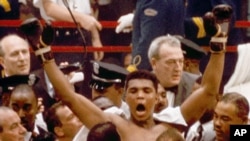The body of legendary U.S. world boxing champion Muhammad Ali arrived back in his hometown of Louisville, Kentucky, on Sunday.
Ali died late Friday at the age of 74 of complications from Parkinson's disease. A motorcade to the funeral home was led by a hearse that had met the chartered plane carrying Ali's body back from Arizona, where he passed away.
Louisville will honor him with a procession through the city Friday followed by a public funeral at a sports arena. Former U.S. President Bill Clinton is among the luminaries scheduled to deliver eulogies.
Ali's spokesman said Ali was "a citizen of the world" and that he wanted people of all walks of life to be able to attend. Accordingly, the service will be held at Louisville's KFC Yum! Center, a multi-purpose sports arena that seats 22,000 people. It will be open to the public and streamed on the Internet.
Sports fans and admirers of Ali remembered and mourned their hero Saturday in the hours after it was announced that the former world heavyweight boxing champion, 1960 Olympic light heavyweight gold medalist and social activist had died. A memorial service was held in Louisville where the man then known as Cassius Marcellus Clay grew up and learned much of his boxing skills.
READ: Muhammad Ali in His Own Words
Later, after he won the world heavyweight title for the first time as a professional fighter, Clay announced that he had embraced Islam, discarded his forebears' "slave name" and became Muhammad Ali.
An American boxing legend who transcended the sport, Ali was both beloved and controversial. He so dominated professional boxing that Sports Illustrated magazine named him Sportsman of the 20th Century. Known for his boastful, passionate, outspoken style, Ali dubbed himself "The Greatest," and explained his boxing style in just a few words: “Float like a butterfly, sting like a bee."
Controversy
Apart from the world of sports, Ali became the center of a firestorm of controversy three years after his name change and conversion, when he refused to be drafted into the U.S. Army, based on his religious beliefs and his opposition to the Vietnam War.
He was charged and convicted of draft evasion and stripped of his boxing title and license. That action kept Ali out of the boxing ring for more than three years - a time when his career should have been at its peak - until the Supreme Court overturned his conviction in 1970.
Ali took up boxing as a boy, advised by a policeman to learn how to defend himself after neighborhood bullies stole his bicycle. His trainer said the young Cassius Clay mixed raw talent with determination, and his skills rapidly increased. After the Rome Olympics, when victory made him a national hero, the young boxer turned pro and moved up through the ranks quickly.
Career highlights
In 1964, Ali overwhelmed fellow American Sonny Liston in a major upset and became world heavyweight champion for the first time. He stayed undefeated until legal problems sidelined him, but suffered his first loss soon after returning to the ring in a 15-round match against compatriot Joe Frazier, also undefeated at the time and who had become heavyweight champion in Ali's absence. Their 1971 bout was known at the time as "the fight of the century."
In many ways, Ali's most spectacular fight was in 1974, when time had begun to slow his pace and take the edge off his boxing skills. Ali faced an undefeated heavyweight champion, George Foreman, who was seven years younger and physically bigger.
The Americans' fight took place in the former Zaire, now the Democratic Republic of Congo, and was hyped as "the Rumble in the Jungle" by publicists. Again, Ali was seen as the underdog, but he used superior tactics to weaken and tire out Foreman, and eventually knocked him out in the eighth round.
After the match, Ali said proudly: "I have wrestled with an alligator. I have tussled with a whale, handcuffed lightning, thrown thunder in jail. Bad, ain't I? Only last week I murdered a rock, injured a stone, hospitalized a brick. I'm so mean I make medicine sick. Bad, fast!"
Ali then met Frazier in 1975 in the Philippines, a bout dubbed "the Thrilla in Manila." Ali endured 14 brutal rounds but emerged victorious.
Retirement and illness
He retired from boxing in 1981 with a 56-5 record, several years before the diagnosis that he suffered from Parkinson's Disease, likely triggered by the thousands of punches he took during his career.
As he weakened, Ali kept a low profile in public in recent years. He won huge cheers when he carried the Olympic torch at the Atlanta Games in 1996, and again in London in 2012, when he escorted the Olympic flag into the stadium during a spectacular opening ceremony.
In 2005, former President George W. Bush presented Ali with the Presidential Medal of Freedom, the highest U.S. civilian honor.










